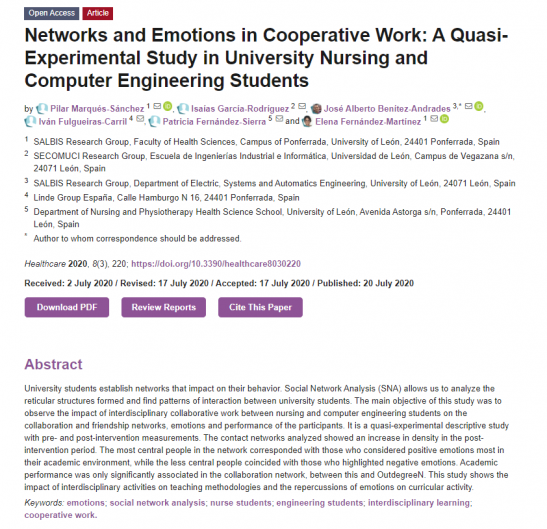Networks and Emotions in Cooperative Work: A Quasi-Experimental Study in University Nursing and Computer Engineering Students
1 SALBIS Research Group, Faculty of Health Sciences, Campus of Ponferrada, University of León, 24401 Ponferrada, Spain
2 SECOMUCI Research Group, Escuela de Ingenierías Industrial e Informática, Universidad de León, Campus de Vegazana s/n, 24071 León, Spain
3 SALBIS Research Group, Department of Electric, Systems and Automatics Engineering, University of León, 24071 León, Spain
4 Linde Group España, Calle Hamburgo N 16, 24401 Ponferrada, Spain
5 Department of Nursing and Physiotherapy Health Science School, University of León, Avenida Astorga s/n, Ponferrada, 24401 León, Spain
* 103Author to whom correspondence should be addressed.
Healthcare 2020, 8(3), 220; https://doi.org/10.3390/healthcare8030220
Received: 2 July 2020 / Revised: 17 July 2020 / Accepted: 17 July 2020 / Published: 20 July 2020
University students establish networks that impact on their behavior. Social Network Analysis (SNA) allows us to analyze the reticular structures formed and find patterns of interaction between university students. The main objective of this study was to observe the impact of interdisciplinary collaborative work between nursing and computer engineering students on the collaboration and friendship networks, emotions and performance of the participants. It is a quasi-experimental descriptive study with pre- and post-intervention measurements. The contact networks analyzed showed an increase in density in the post-intervention period. The most central people in the network corresponded with those who considered positive emotions most in their academic environment, while the less central people coincided with those who highlighted negative emotions. Academic performance was only significantly associated in the collaboration network, between this and OutdegreeN. This study shows the impact of interdisciplinary activities on teaching methodologies and the repercussions of emotions on curricular activity.

